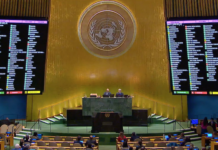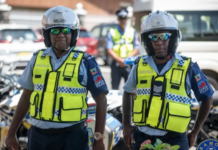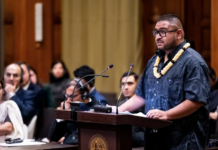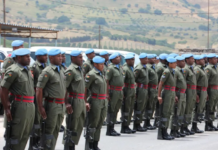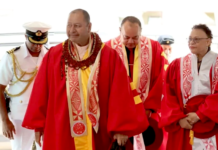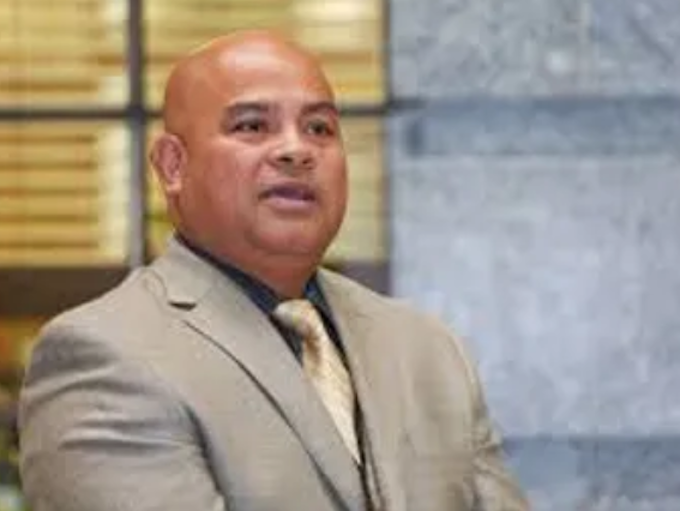
By Mar-Vic Cagurangan, editor-in-chief of the Pacific Island Times
The Federated States of Micronesia will receive more US economic assistance under the Compact of Free Association in exchange for the Pacific nation’s broader role in regional security that entails expanded military use of its land, water and air.
“Of paramount importance is that our nation’s citizenry be informed in advance when US fighter jets fly over the State of Yap, for example, or when the US practice firing anti-aircraft missiles from the ground,” FSM President David Panuelo said in a state of the nation address delivered on Friday before the FSM Congress.
Panuelo advised the FSM citizens to also expect more training exercises in and around the nation’s ocean.
“These exercises will be increasing in frequency over the next several years, and while they are ultimately in our national interest and in the interest of our nation’s security — of which the US is our indisputable guardian — it is important that our citizens know about them well in advance so that our people do not see these activities and then immediately fear the worst,” he added.
The compact grants the United States “strategic denial” — the option to deny foreign militaries access to the freely associated nation and provide for US defence sites.
Panuelo acknowledged that the US military’s ramped-up presence in the region was brought about by growing geopolitical conflicts in the Pacific, where Washington and Beijing play tug of war.
The unabated rivalry is compounded by China’s persistent threats to take over Taiwan, which the US vows to defend.
Amplified military activities
Panuelo said the amplified military activities in Yap will require the expansion of the state ports and increased presence from the US Navy Seabees.
In his state of the nation address, Panuelo said the FSM would receive $140 million in annual sector grant assistance from Washington under the compact’s renewed economic provisions. The agreed amount represents more than $50 million a year over current assistance levels, the president added.
“The good news is that there is much we have already completed successfully with regards to our compact’s negotiations,” Panuelo said.
“I have also made clear that in addition to this sector grant assistance, a one-time contribution of funds into our Compact Trust Fund remains a critical component of our nation’s economic requirements, and is necessary for the health and sustainability of the fund,” Panuelo said.
The economic provisions of the compact are set to expire in September. Washington last week announced the signing of a memorandum of understanding, separately with Palau and the Marshall Islands, renewing the economic assistance for both freely associated states.
Washington and the FSM have yet to formally sign an agreement, but Panuelo said he has “shaken hands” with Joseph Yun, the US special presidential envoy for compact negotiations, on the proposed new deal.
“There remains some important work to be done before our nation’s negotiating teams can sign off,” Panuelo said.
Among sticky points
Among the sticky points is the FSM-proposed update on fiscal procedures, which Panuelo said must “reflect more deference to the FSM in the management and implementation of funding assistance.”
Panuelo earlier asked Washington to let the FSM manage its own financial responsibilities under the compact, noting that the funds provided by the treaty are part of diplomatic arrangements rather than largesse.
Read related story US asked not to micromanage FSM Other pending issues include “the development of mutually acceptable subsidiary agreements that are appropriate for the next compact period.”
At the same time, the negotiating panels are working on the continuation of US programmes such as Pell grants, and the reinstatement of US Department of Education programmes previously made available to FSM students.
“The FSM will work very hard until we are satisfied with all aspects of the agreements between our country and the United States,” Panuelo said.
Besides the compact funds, Panuelo reported that the FSM has received a total of $747 million from other foreign donors and lenders including the World Bank, the Asian Development Bank, Japan, China, the European Union, Australia and India.
“The figure would be higher if we could financially measure certain forms of in-kind assistance,” Panuelo said.
“Part of this success is due to the improved coordination between the nation and its development partners since the establishment of the Overseas Development Assistance policy in 2013,” Panuelo said.
Foreign donations financed the FSM’s infrastructure projects including the administration’s $100 million “Pave the Nation” initiative.
Republished from the Pacific Island Times with permission.








